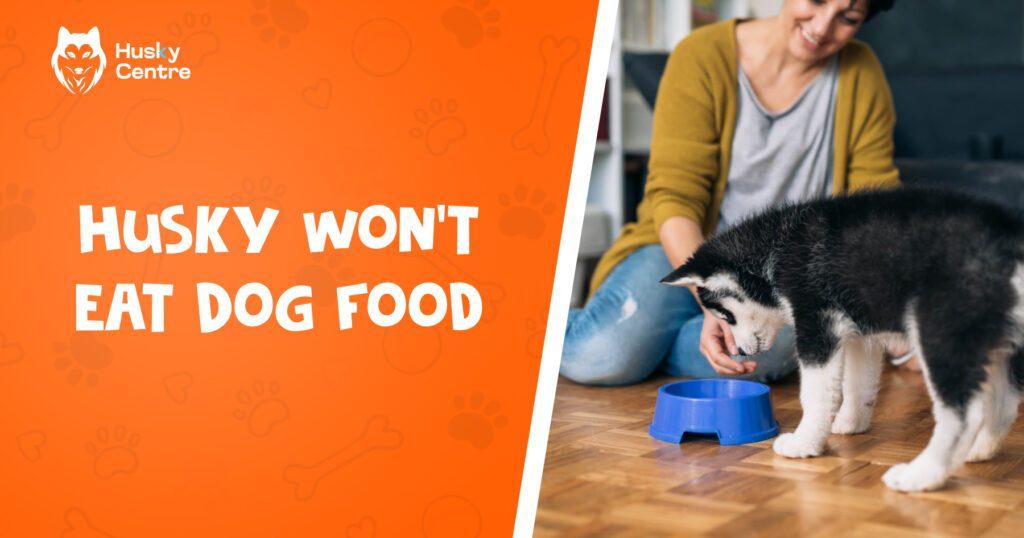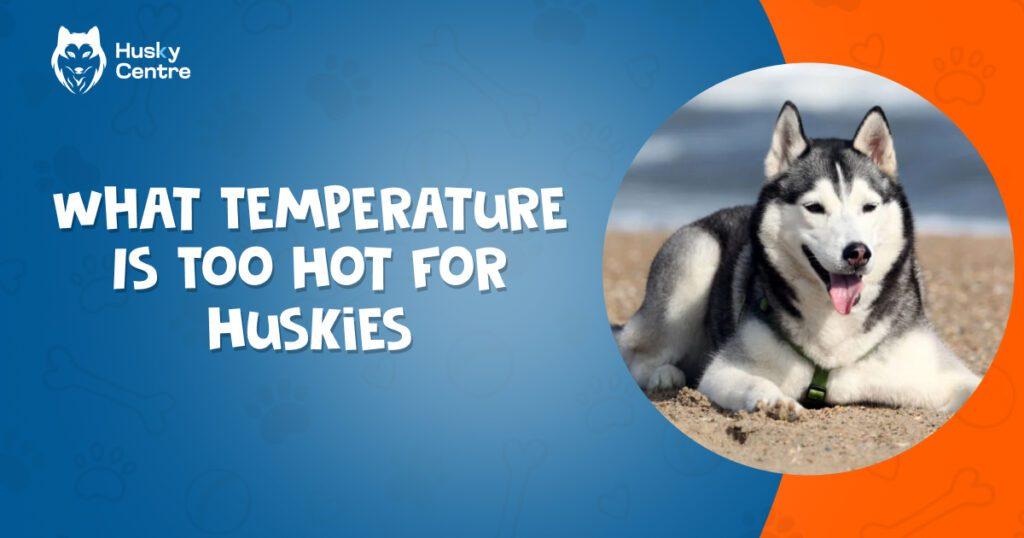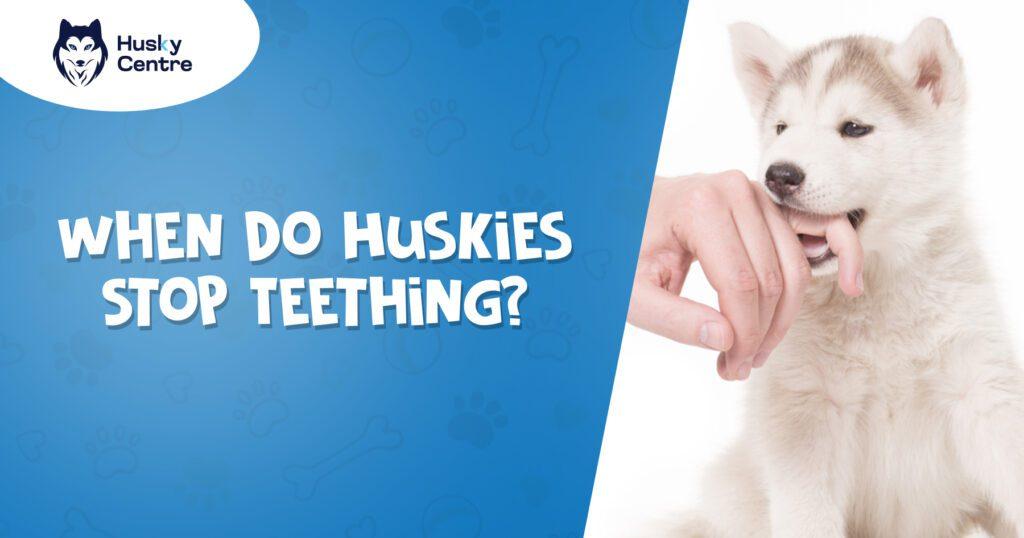A Husky may refuse to eat dog food due to dental issues or food allergies. Stress or boredom can also be factors.
Huskies are known for their unique eating habits. They can be picky eaters, often refusing dog food for various reasons. Understanding these reasons is crucial for maintaining their health. Dental problems, such as toothaches, can deter them from eating. Food allergies or intolerances might also play a role.
Stress, anxiety, or even boredom can affect their appetite. Offering a balanced diet tailored to their needs is essential. Monitor their behavior and consult a vet if the issue persists. Ensuring they have a stress-free environment and engaging activities can help improve their eating habits.
Common Reasons Why Huskies Refuse Dog Food
When a Husky won’t eat dog food, it can be frustrating and worrisome. Understanding the common reasons why Huskies refuse dog food can help you address this issue more effectively. In this section, we will explore some of the most typical reasons behind this behavior.
1. Health Issues
Huskies may refuse dog food if they are experiencing health problems. Dental issues, gastrointestinal problems, or food allergies can cause discomfort and reduce appetite. A visit to the vet can help rule out these conditions.
2. Dietary Preferences
Huskies are known for their unique dietary preferences. They may simply not like the taste or texture of certain dog foods. Experimenting with different brands or flavors can help identify their preferences.
3. Behavioral Factors
Behavioral factors can play a significant role. Some Huskies may refuse food due to stress, anxiety, or changes in their environment. Providing a calm and stable eating environment can encourage better eating habits.
4. Overfeeding
Overfeeding with treats or table scraps can lead to a lack of interest in regular dog food. Limiting treats and sticking to a feeding schedule can help ensure they are hungry at mealtime.
5. Food Quality
Low-quality dog food may not meet the nutritional needs of a Husky. High-quality, nutrient-rich dog food can be more appealing and beneficial for their health.
6. Feeding Routine
An inconsistent feeding routine can confuse a Husky. Establishing a regular feeding schedule can help create a sense of routine and predictability, making them more likely to eat.
7. Competition
In multi-pet households, competition for food can cause stress and reduce a Husky’s appetite. Ensuring each pet has its own feeding space can alleviate this issue.
8. Temperature and Climate
Huskies are sensitive to temperature changes. Extreme heat can reduce their appetite. Ensuring they have a cool and comfortable place to eat can help.
9. Food Storage
Improper food storage can affect the taste and freshness of dog food. Ensuring the food is stored in an airtight container can help maintain its quality and appeal.
Health-related Causes
Is your Husky refusing to eat dog food? It can be a worrying situation. One major factor could be health-related causes. Understanding these causes can help you take the right steps to get your dog back on track.
Possible Medical Conditions
Several medical conditions can make your Husky lose interest in food. Dental issues are common. Bad teeth or gum disease can make chewing painful. Other causes include:
- Gastrointestinal problems: Issues like stomach ulcers or pancreatitis can cause discomfort, leading to a loss of appetite.
- Infections: Bacterial or viral infections can affect your dog’s desire to eat.
- Kidney disease: This condition often causes nausea, making food less appealing.
- Liver disease: The liver plays a crucial role in digestion, and any issues here can affect hunger.
- Parasites: Worms and other parasites can cause stomach pain and reduce appetite.
Below is a table summarizing some of these conditions:
| Condition | Symptoms |
| Dental Issues | Painful chewing, drooling, bad breath |
| Gastrointestinal Problems | Vomiting, diarrhea, stomach pain |
| Infections | Fever, lethargy, loss of appetite |
| Kidney Disease | Increased thirst, vomiting, poor appetite |
| Liver Disease | Yellowing of skin, lethargy, loss of appetite |
| Parasites | Weight loss, diarrhea, visible worms in stool |
Importance Of Consulting A Veterinarian
Consulting a veterinarian is crucial if your Husky won’t eat. Vets can perform thorough examinations to determine the underlying cause. They may conduct blood tests, X-rays, or ultrasounds to find the problem.
Here are some reasons why a vet visit is essential:
- Accurate diagnosis: Only a vet can diagnose the exact issue.
- Proper treatment: Vets can prescribe the right medication or treatment plan.
- Prevent complications: Early diagnosis can prevent the condition from worsening.
- Nutritional advice: Vets can recommend special diets if needed.
- Peace of mind: Knowing the cause can relieve your worries.
Remember, your Husky’s health is important. Ignoring the issue can lead to severe complications. Always consult a vet when you notice changes in eating habits.
Behavioral And Environmental Factors
It’s concerning when your Husky won’t eat dog food. Many factors contribute to this issue, especially behavioral and environmental factors. Understanding these aspects can help you address and solve the problem effectively.
Stress And Anxiety
Stress and anxiety are significant reasons why a Husky may refuse to eat. Dogs, like humans, can feel anxious due to various reasons. Changes in the household such as moving to a new home, or the arrival of a new pet or baby, can trigger stress. This anxiety often results in a lack of appetite.
Sometimes, Huskies may feel stressed due to loud noises or unfamiliar environments. Thunderstorms, fireworks, and even loud household appliances can cause significant stress. Consistent stress can lead to long-term eating problems.
Common signs of anxiety in dogs include:
- Pacing or restlessness
- Excessive barking or whining
- Hiding or seeking comfort
- Shaking or trembling
Creating a calm environment for your Husky can help reduce anxiety. Providing a safe space where they can retreat to during stressful events can be very beneficial. Routine and consistency also play crucial roles in reducing anxiety in dogs.
Feeding Environment
The feeding environment greatly impacts a Husky’s willingness to eat. Dogs are sensitive to their surroundings, and an uncomfortable environment can deter them from eating. Ensure the feeding area is quiet and free from distractions. Loud noises and high traffic areas can make your Husky feel uneasy during meal times.
Cleanliness of the feeding area is also essential. Dirty bowls or a cluttered space can discourage your dog from eating. Make sure to wash the bowls after every meal and keep the feeding area tidy.
Consider the following tips to improve the feeding environment:
- Feed your Husky in a consistent location
- Use a comfortable and stable feeding bowl
- Ensure the area is well-lit and not too hot or cold
- Remove any potential stressors from the vicinity
Some Huskies prefer eating in solitude, away from other pets. If you have multiple pets, try feeding them separately to avoid competition or intimidation. Observe your Husky’s behavior and adjust the feeding environment accordingly.
Evaluating Dog Food Quality
Does your Husky refuse to eat dog food? Evaluating the quality of dog food might be the key. Understanding what goes into their bowl can make a big difference. This guide will help you understand the importance of high-quality dog food and how to switch brands effectively.
Importance Of High-quality Dog Food
Feeding your Husky high-quality dog food is crucial for their overall health. High-quality dog food ensures they get the necessary nutrients. Here are some reasons why:
- Balanced Diet: High-quality food provides the right balance of proteins, fats, and carbohydrates.
- Better Digestion: Ingredients in premium dog food are easier to digest.
- Healthy Coat: Nutrients like omega-3 and omega-6 fatty acids keep their coat shiny and healthy.
- Improved Energy Levels: Quality food boosts their energy and activity levels.
Compare the ingredients of different dog food brands using the table below:
| Brand | Protein Source | Main Ingredients | Price Range |
| Brand A | Chicken | Chicken, Brown Rice, Vegetables | $$ |
| Brand B | Beef | Beef, Sweet Potatoes, Fruits | $$$ |
| Brand C | Fish | Fish, Oats, Peas | $$ |
Switching Dog Food Brands
Switching your Husky’s food brand should be done gradually. Abrupt changes can cause digestive issues. Follow these steps:
- Mix Old and New Food: Start by mixing 25% of the new food with 75% of the old food.
- Increase New Food Gradually: After a few days, increase the new food to 50%.
- Monitor Your Husky: Watch for any signs of discomfort or allergies.
- Full Transition: After a week, switch to 100% new food if there are no issues.
Here’s a simple transition schedule:
| Days | Old Food | New Food |
| 1-3 | 75% | 25% |
| 4-6 | 50% | 50% |
| 7-9 | 25% | 75% |
| 10+ | 0% | 100% |
Observe your Husky during the transition. Look for signs like vomiting, diarrhea, or lethargy. If any of these occur, slow down the transition process. Remember, patience is key to a successful switch.
Tips To Encourage Eating
Is your Husky refusing to eat dog food? This can be quite concerning for any pet owner. Huskies are known for their unique eating habits. Sometimes, they might become picky eaters. Don’t worry! Here are some tips to encourage eating that could help your furry friend.
Establishing A Feeding Routine
Creating a consistent feeding schedule is crucial. Dogs thrive on routine. Your Husky will know when it’s time to eat. Follow these steps to establish a feeding routine:
- Feed at the same times daily: Choose specific times for breakfast and dinner. Stick to these times every day.
- Limit feeding duration: Allow your Husky 20 minutes to eat. If food is not finished, remove the bowl.
- Avoid snacks between meals: Snacks can reduce your dog’s hunger for the main meal.
Here’s a sample feeding schedule:
| Time | Activity |
| 7:00 AM | Breakfast |
| 12:00 PM | Playtime or walk |
| 6:00 PM | Dinner |
Consistency is key. Over time, your Husky will adapt to this schedule. This will help in managing their eating habits better.
Making Mealtime Enjoyable
Turn mealtime into a fun and pleasant experience. This will make your Husky look forward to eating. Here are some tips to make mealtime enjoyable:
- Create a calm environment: Ensure mealtime is free from loud noises or distractions.
- Use puzzle feeders: These make eating a game. They stimulate your dog’s mind and encourage eating.
- Rotate flavors: Offer different flavors of dog food. This can prevent boredom from eating the same food daily.
Here’s a list of engaging activities during mealtime:
- Play soft music to create a relaxing atmosphere.
- Hand-feed your dog small pieces to build trust and interest.
- Add a small amount of warm water to dry food to enhance its aroma.
Making mealtime fun will encourage your Husky to eat regularly. A happy dog is a healthy dog!
Homemade And Alternative Diets
Is your Husky turning up its nose at commercial dog food? You’re not alone. Many dog owners face this issue. One solution involves exploring homemade and alternative diets. These options can be nutritious and enticing for your furry friend. Let’s dive into some practical and tasty solutions.
Homemade Dog Food Recipes
Creating your own dog food can be fun and rewarding. It’s also a great way to ensure your Husky gets all the nutrients it needs. Here are some easy and nutritious recipes:
- Chicken and Rice Delight
- 1 cup of cooked chicken breast
- 1/2 cup of cooked brown rice
- 1/2 cup of mixed vegetables (carrots, peas)
- 1 tablespoon of olive oil
- Beef and Sweet Potato Feast
- 1 cup of ground beef
- 1 cup of cooked sweet potatoes
- 1/2 cup of green beans
- 1 teaspoon of fish oil
It’s important to ensure your homemade recipes are balanced and nutritious. This means including protein, carbs, fats, and vitamins.
| Ingredient | Benefits |
| Chicken | High in protein, essential for muscle health |
| Brown Rice | Good source of carbohydrates, provides energy |
| Vegetables | Rich in vitamins and fiber, supports digestion |
Always consult your vet before making dietary changes to ensure it’s suitable for your dog’s health.
Alternative Diets
If homemade isn’t your thing, there are alternative diets that might appeal to your Husky. These include raw food diets, freeze-dried options, and grain-free kibble.
- Raw Food Diet
- Includes raw meat, bones, and organs
- Offers high protein and natural nutrients
- Must be handled with care to avoid contamination
- Freeze-Dried Food
- Retains nutrients due to minimal processing
- Convenient and easy to store
- Just add water to serve
- Grain-Free Kibble
- Ideal for dogs with grain allergies
- Contains alternative carbs like sweet potatoes
- Often higher in protein
Each alternative diet has its own benefits. Raw food diets are rich in natural nutrients, but require careful handling. Freeze-dried food retains most of its nutrients and is convenient. Grain-free kibble is great for dogs with specific dietary needs.
Discuss these options with your vet to make the best choice for your Husky.
Addressing Picky Eating Habits
Is your Husky turning its nose up at dog food? Picky eating habits in Huskies can be frustrating for pet owners. Addressing these habits involves a combination of training, discipline, and a careful introduction of new foods. Let’s dive into some effective strategies to help your Husky enjoy its meals again.
Training And Discipline
Training and discipline play a crucial role in managing your Husky’s eating habits. Consistency is key. Here are some effective strategies:
- Set a feeding schedule: Offer food at the same times each day. This helps establish a routine.
- Limit mealtime duration: Leave the food out for 20-30 minutes. If your Husky doesn’t eat, remove the bowl.
- Avoid table scraps: Feeding human food encourages picky eating. Stick to dog food only.
Creating a structured feeding environment is essential. Here’s a quick guide:
| Action | Result |
| Feed at specific times | Establishes routine |
| Remove uneaten food | Encourages eating during mealtime |
| Use a designated feeding area | Reduces distractions |
Gradual Introduction Of New Foods
Introducing new foods slowly can help your Husky adapt without stress. Start by mixing a small amount of new food with the current diet. Gradually increase the new food over a week.
- Day 1-2: Mix 10% new food with 90% current food.
- Day 3-4: Increase to 30% new food and 70% current food.
- Day 5-6: Mix 50% new food with 50% current food.
- Day 7: Offer 70% new food and 30% current food.
- Day 8: Serve 100% new food.
Monitor your Husky’s reaction to the new food. Watch for signs of allergies or digestive issues. If any issues arise, consult your vet immediately.
Here are some tips to make the transition smoother:
- Add warm water to dry food to enhance aroma and texture.
- Incorporate healthy toppers like cooked vegetables or lean meats.
- Stay patient and consistent with the new feeding routine.
Introducing new foods gradually ensures your Husky adjusts well and maintains a balanced diet.
Monitoring And Adjusting
Is your Husky refusing to eat its dog food? Monitoring and adjusting their diet could be the solution you need. By carefully observing their eating habits and making necessary changes, you can ensure your furry friend stays healthy and happy.
Keeping Track Of Your Husky’s Eating Habits
Start by keeping a close eye on your Husky’s eating patterns. Note the times they eat, the amount they consume, and any changes in their behavior. Use a journal or an app to record:
- Meal times
- Food quantities
- Mood and energy levels
- Any refusals or skipped meals
This information will help you identify any patterns or potential issues. Is your Husky more active in the morning? Do they seem less interested in certain types of food?
Creating a table can also be useful:
| Day | Meal Time | Food Amount | Behavior |
| Monday | 8 AM | 1 cup | Energetic |
| Monday | 6 PM | 1 cup | Disinterested |
This table helps you visualize your Husky’s eating habits and make informed decisions. Regularly updating this information will give you a clear picture of their diet and well-being.
Adjusting The Diet As Needed
If your Husky isn’t eating their food, consider adjusting their diet. Start by evaluating the quality of their current food. Is it nutritious and appealing? Switch to a high-quality brand if necessary.
Introduce new foods gradually. Mix a small amount of new food with their current food. Increase the new food’s portion over a week. This prevents digestive upset and helps your Husky adjust.
Offer variety. Huskies can get bored with the same food. Add these options:
- Fresh vegetables
- Lean meats
- Healthy grains
Consult your vet before making significant changes. They can recommend the best diet for your Husky’s needs.
Observe how your Husky reacts to the new diet. Use another table to track changes:
| Day | New Food Amount | Reaction |
| Tuesday | 1/4 cup | Curious |
| Wednesday | 1/2 cup | Interested |
Adjust portions based on their response. Ensuring a balanced diet is key to keeping your Husky healthy and happy.
Frequently Asked Questions
Why Is My Husky Not Eating Dog Food?
Your husky might not eat due to stress, illness, or dislike for the food. Try different brands or flavors. Consult a vet if the issue persists.
How To Make Husky Eat Dog Food?
Gradually mix dog food with current diet. Establish a regular feeding schedule. Ensure the food is high-quality and appetizing. Add warm water or low-sodium broth to enhance flavor. Maintain consistency.
Are Husky Dogs Picky Eaters?
Yes, husky dogs can be picky eaters. They often prefer high-quality, varied diets. Ensuring nutritional balance is crucial for them.
Why Is My Husky Hungry All The Time?
Huskies may feel hungry due to high energy levels, insufficient diet, or health issues. Consult your vet for advice.
Conclusion
Finding the right solution for a picky husky requires patience and persistence. Try different foods and feeding strategies. Always consult your vet for tailored advice. Remember, each husky is unique and might need a specific approach. With time and effort, your husky will enjoy mealtime again.


Meet Jarred, the heart and soul behind HukyCentre. With a deep affection for furry friends, he pours his passion into every word he writes. His genuine love for dogs shines through in his engaging and informative content. As a dedicated dog enthusiast, Jarred’s goal is to share valuable insights and tips that resonate with fellow dog lovers. Join Jarred on the journey as he celebrates the joy and companionship that dogs bring into our lives.



